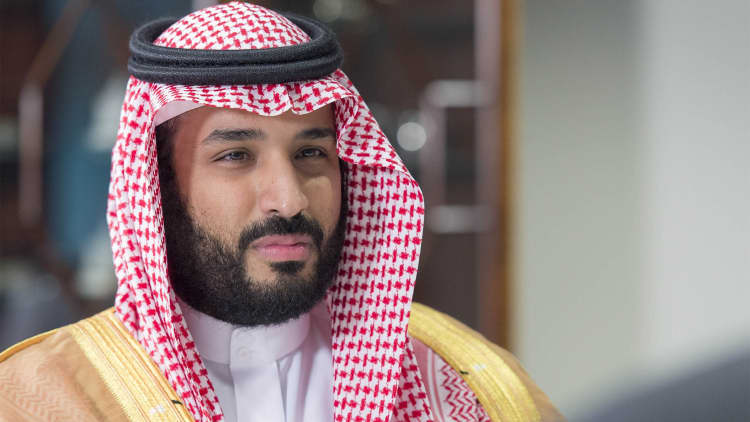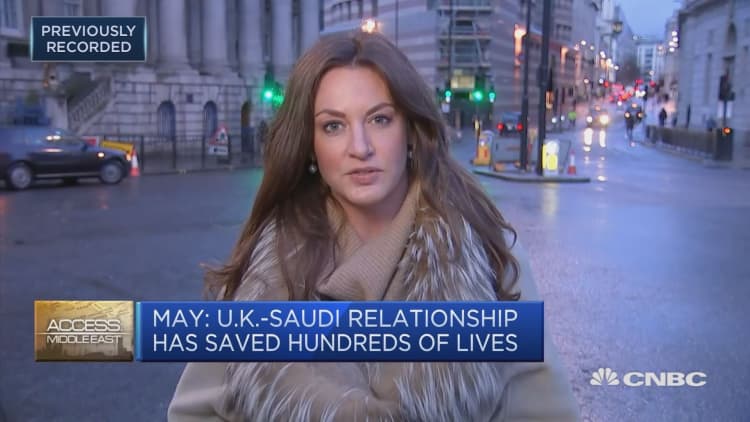Saudi Arabia's crown prince and the U.K.'s prime minister launched an economic and investment partnership worth billions of dollars on Wednesday, amid human rights protests in London and political pressure in parliament.
Saudi's Crown Prince Mohammed bin Salman is in the U.K. for a three-day state visit. On the first day of the trip, he dined with Queen Elizabeth II at Buckingham Palace and met Prime Minister Theresa May and her ministers in Downing Street.
There, the prime minister and Mohammed bin Salman, or MBS as he is known, hosted the inaugural meeting of the "U.K.-Saudi Arabia Strategic Partnership Council," a trade and investment body that hopes to see multi-billion deals between the two kingdoms.
"The meeting agreed a landmark ambition for around £65 billion ($90.3 billion) of mutual trade and investment opportunities over the coming years, including direct investment in the U.K. and new Saudi public procurement with U.K. companies," a Downing Street spokesperson said in a press release.
"This is a significant boost for U.K. prosperity and a clear demonstration of the strong international confidence in our economy as we prepare to leave the European Union."
Reform agenda
Mohammed bin Salman's visit comes at a time when all eyes are on the heir to the Saudi throne to see what direction the Middle East superpower will take.
Already the crown prince has established himself as a more progressive force, having initiated a series of radical (at least for the conservative religious country) cultural and economic reforms, such as Vision 2030, which is part of the country's transition from being an oil-based economy.

While the crown prince has been praised for initiating change, such as lifting a ban on women driving and allowing women to attend sporting events, Saudi Arabia's societal and economic transformation is only just beginning and the kingdom is still perceived as a repressive regime with a poor human rights record.
The U.K. has a long-standing relationship with Saudi Arabia, their royal families appearing to share a mutual respect. Following his lunch with the queen, the crown prince dined with Prince Charles and Prince William, Duke of Cambridge, in the evening.
They also have a long-standing trade relationship — not just of arms, the most well-known U.K. export to Saudi — but also of transport-related equipment, medicinal products, foodstuffs and power-generating equipment, according to the Saudi British Joint Business Council.
The prime minister praised Saudi's "ambitious reform program" and offered the U.K.'s support "to progress and intensify these reforms, particularly on women's rights, and on universal human rights," the Downing Street statement said.
The latest trade initiative, the Strategic Partnership Council, envisages "new investment and procurement opportunities" that will be spread across a range of sectors including education (the U.K. is going to help Saudi reform its education system), training and skills, financial and investment services.
In addition, the spokesperson said there will be opportunities in the sectors of "culture and entertainment, health care services and life sciences, technology and renewable energy and the defence industry."
The latter, the defense industry, is one of the most controversial aspects of the U.K.'s relationship with Saudi Arabia.
Human rights
Hundreds of human rights protesters gathered outside Downing Street Wednesday demonstrating against the U.K.'s arms sales to Saudi Arabia and its bombardment of Yemen — a country experiencing a humanitarian disaster due to the civil war, which is seen as a proxy war between Saudi Arabia and Iran — as well as human rights abuses.
Protesters chanted "Hands off Yemen — stop the bombing now" and said the crown prince should not have been invited.

May defended herself when questioned by her political opponent, Labour leader Jeremy Corbyn, at the weekly "Prime Minister's Questions" session in parliament.
Asked whether Bin Salman should have been invited to the U.K., May said the two countries had a historic relationship and one which had helped to potentially save hundreds of British lives — presumably because of anti-terrorism intelligence shared between the countries.
Michael Stephens, Middle East research fellow at the Royal United Services Institute for Defence and Security Studies (RUSI) in London, told CNBC that the trip was designed to show that there was more to the U.K.-Saudi relationship than arms and oil.
"One of the reasons that there's an engagement with Mohammed bin Salman, and indeed with the rest of the Gulf, is to get away from this perception that the U.K. only cares about selling arms to the Gulf states. But what (Gulf states) are actually asking for is investments into high-tech sectors and high-growth sectors that will help them move away from being an oil-based economies," he told CNBC Thursday.
The Downing Street spokesperson insisted May had raised the issue of Yemen with the crown prince.
"Following the meeting of the Strategic Partnership Council, the prime minister and the crown prince received a briefing from U.K. national security officials on foreign policy issues, including Yemen," the spokesperson said.
"The prime minister raised our deep concerns at the humanitarian situation in Yemen. The prime minister and crown prince agreed on the importance of full and unfettered humanitarian and commercial access, including through the ports, and that a political solution was ultimately the only way to end the conflict and humanitarian suffering in Yemen," the spokesperson said.
"They also discussed Iran, agreeing on the importance of working together to counter Iran's destabilizing regional activity, and Iraq, including the importance of supporting reconstruction efforts."
On Thursday, the crown prince will attend a business conference in London before travelling to the prime minister's country residence, Chequers, in Buckinghamshire outside London, before returning to the capital.


